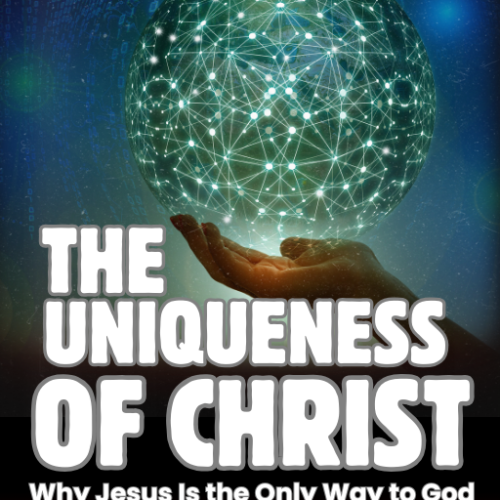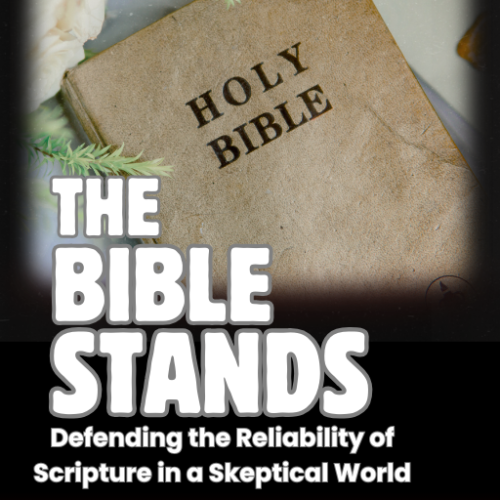Alleged Absurdities in the Bible: Battling Supposed Contradictions in the Bible
Volume 24 of the Apologia Series
Have you ever encountered skeptics or critics who claim that the Bible is filled with contradictions and absurdities? Do you struggle to understand or explain some of the more challenging passages in Scripture? In Alleged Absurdities in the Bible: Battling Supposed Contradictions in the Bible (Volume 24 of the Apologia Series), you’ll be equipped with the knowledge and tools to respond to these common accusations with confidence, clarity, and a firm understanding of biblical truth.
This book takes an in-depth look at the alleged contradictions, discrepancies, and “absurdities” that critics often point to in the Bible. It provides well-researched, biblically grounded responses to these supposed issues, helping you to not only defend the faith but also deepen your own understanding of God’s Word. Whether you’re a new believer or a seasoned Christian, Alleged Absurdities in the Bible is a must-have resource to address the challenging questions surrounding the reliability of Scripture.
Why This Book Matters
The Bible is often criticized as a book filled with contradictions, inaccuracies, and even absurdities. Some critics claim that these contradictions undermine its credibility and authenticity. As a Christian, it’s crucial to have a clear and reasoned response to these accusations—one that is rooted in the truth of God’s Word. Alleged Absurdities in the Bible will provide you with practical tools to engage with these difficult questions, helping you to defend the Bible’s reliability and maintain your confidence in its divine inspiration.
By addressing both well-known and lesser-known supposed contradictions, this book is designed to help you grow in your ability to understand and explain the Bible in a way that demonstrates its internal consistency and divine origin. You’ll learn to recognize that what may appear to be contradictions are often misunderstandings, misinterpretations, or differences in perspective that are easily explained when placed within the proper historical, cultural, and literary context.
What’s Inside
- Introduction: Understanding the Alleged Absurdities
- What exactly do critics mean when they claim the Bible contains contradictions and absurdities? This introductory chapter defines these claims and explains why they matter. It also lays the groundwork for the book’s exploration of these alleged contradictions and provides a biblical foundation for defending Scripture.
- Understand the importance of maintaining the integrity and reliability of the Bible and how responding to accusations strengthens your faith.
- The Bible and Its Interpretation
- Before addressing specific contradictions, it’s essential to understand how the Bible was written and how it should be interpreted. This section delves into the principles of biblical interpretation (hermeneutics) and why understanding context—historical, cultural, linguistic—is critical for interpreting Scripture correctly.
- Learn why many perceived contradictions are simply misunderstandings that arise when passages are taken out of context or read without considering the original audience and intent.
- Alleged Contradictions in Creation Accounts
- One of the most common areas where critics claim the Bible contradicts itself is in the creation accounts. This chapter carefully examines the two creation narratives in Genesis and demonstrates how they are complementary, not contradictory.
- Explore how the Bible’s account of creation fits within both theological and scientific frameworks, addressing the supposed conflicts between Genesis and modern scientific understanding.
- Contradictions in the Gospels: Harmonizing the Accounts
- Critics often point to differences in the gospel accounts of Jesus’ life, death, and resurrection as evidence of contradictions. This chapter takes a close look at these differences and explains why they actually enhance the credibility of the gospels.
- Learn how understanding the different perspectives of the gospel writers enriches our understanding of the events they recorded and how to harmonize apparent discrepancies.
- Historical Events: Alleged Discrepancies in the Bible’s Timeline
- Many skeptics question the historical accuracy of the Bible, pointing to supposed contradictions in dates and events. This section examines key historical events and explains how these challenges can be reconciled with a deeper understanding of biblical chronology, ancient historical records, and cultural context.
- Discover how the Bible’s historical reliability stands up to scrutiny and how differences in ancient sources can explain these alleged discrepancies.
- Theological and Ethical Issues: Are There Absurdities in Christian Doctrine?
- Some critics argue that the Bible’s teachings on theology and ethics are absurd or contradictory. This chapter addresses these criticisms by showing how biblical doctrines, such as the nature of God, the Trinity, salvation, and morality, are consistent and reasonable within a Christian worldview.
- Learn how to engage with questions about difficult theological concepts and defend biblical teachings with wisdom and clarity.
- Understanding Literary Genres in the Bible
- The Bible is made up of various literary genres, each requiring different interpretative approaches. This chapter explores how misunderstanding the literary genre of a passage can lead to misinterpretations.
- Gain insights into how genres like poetry, parables, history, and prophecy shape the way we interpret the text and how this can clear up many supposed contradictions.
- Responding to Common Objections
- This section tackles some of the most frequently cited objections to the Bible’s reliability, including apparent contradictions in numbers, names, and genealogies. You’ll learn how to respond to these objections with historical, linguistic, and theological explanations that maintain the integrity of Scripture.
- Equip yourself with practical, clear responses that address specific objections about the Bible’s accuracy and consistency.
- Building Confidence in the Bible’s Reliability
- This chapter helps you solidify your understanding of the Bible’s reliability, answering not only common objections but also providing arguments for the Bible’s trustworthiness.
- Learn how to engage with skeptics without fear, knowing that the Bible’s divine inspiration, consistency, and historical accuracy are solid foundations for your faith.
- Conclusion: Strengthening Your Faith and Defending the Word of God
- In this final chapter, you’ll be encouraged to strengthen your own faith by embracing the truth of Scripture, while also being equipped to defend it in a loving, confident manner.
- Understand how the process of addressing contradictions and absurdities can deepen your understanding of the Bible and strengthen your ability to defend the faith in today’s world.
Who Should Read This Book?
- Christians Seeking Confidence in Scripture: If you’ve ever struggled with doubts about the Bible or faced challenges from critics, this book will provide you with the knowledge and confidence to defend the Word of God.
- Apologists and Defenders of the Faith: Whether you’re a seasoned apologist or new to defending the faith, this book offers valuable insights and practical tools to engage with skeptics effectively.
- Students and Bible Scholars: For those studying theology, biblical studies, or apologetics, Alleged Absurdities in the Bible provides a scholarly yet accessible approach to resolving contradictions in Scripture.
- Pastors and Church Leaders: Pastors and church leaders will find this book a helpful resource for addressing questions from their congregations and preparing for public discussions on the reliability of the Bible.
- Anyone Curious About the Bible’s Authenticity: If you’ve encountered claims of contradictions in the Bible and want to know how to address them, this book offers a thorough exploration of common criticisms and biblical responses.
Why Choose This Book?
- Biblically Grounded: Each chapter is grounded in the Word of God, providing scriptural references and theological insights to respond to challenges to Scripture’s reliability.
- Scholarly and Accessible: This book strikes the perfect balance between academic rigor and accessibility, making it easy to understand while offering in-depth analysis.
- Practical and Actionable: You’ll not only understand the answers to tough questions but also gain practical tips for engaging with critics and skeptics in everyday life.
- Confidence in the Word of God: This book will help you stand firm in your belief that the Bible is the inspired, reliable Word of God, and empower you to defend it with grace and truth.
Order Your Copy Today!
Don’t let the accusations of contradictions or absurdities undermine your confidence in the Bible. Order Alleged Absurdities in the Bible today and discover how to confidently respond to skeptics, deepen your understanding of Scripture, and defend the Word of God with clarity and conviction. This book will equip you to tackle the tough questions and stand firm in your faith, knowing that the Bible is trustworthy and true.






Reviews
There are no reviews yet.